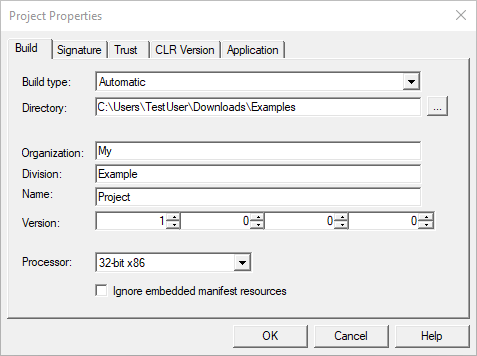Project Properies

Build type
The full list of available build types:

- Automatic
- Builds one private assembly with all suitable file (DLLs, TLBs) and one application manifest for every executable program in the list. These application manifests have no direct file references - only assembly references. This is the preferred way to isolate applications. See Step-by-Step Guide for more information on building automatic projects.
- Application Manifest
- Builds one application manifest for each executable program in the list. These manifests directly reference all DLLs and TLBs in the list.
- Private Assembly
- Builds a private assembly. Normally used to test assemblies before changing them to shared and to test private assemblies intended for a private assembly list.
- Shared Assembly
- Builds a shared assembly. See Building Shared Assemblies for more information.
- CLR (.Net) Class Win32 Manifests
- Builds win32 manifests for CLR classes implemented by .Net assemblies. See Accessing .Net (CLR Managed) Classes from Win32 Applications for more information.
Directory
This is the project's destination directory also referenced to as the target directory. All project files are copied or written to this directory or subdirectories of this directory. Some files may be moved from the target directory to the assembly subdirectory. This is necessary for the private or shared assembly to work. If a copy of such file is required in the target directory, just copy the file (do not move) from the assembly subdirectory back to the target directory.
Organization, Division, Name
These three fields are used to make the assembly name. See Step-by-Step Guide for more information on assembly names.
Version
This is the private or shared assembly version. Note that application manifests versions are always derived from the application version resource.
Windows version resource actually contains four version numbers:
- binary, four-part file version
- binary, four part product version
- text, single string (localized), file version
- text, single string (localized), product version
Manifest Maker uses the binary file version.
Processor
Processor architecture for which this project will be built. All files (DLLs, programs, manifests and shared assemblies) that do not match this processor type will be ignored during the build.
Manifest Maker recognizes three processor types, but only supports building manifests for the standard 32-bit x86 and the 64-bit amd64 (Intel's EM64T) architectures. The Any CPU choice is intended for CLR and advanced builds. A manifest built by Manifest Maker will only contain modules and assembly references for the architecture selected in the project properties dialog. All other files are ignored.
Note that you need to run Manifest Maker on a 64-bit x64 system to build 64-bit manifests.
Ignore embedded manifest resources
By default Manifest Maker recognizes embedded resource manifests. During build DLLs with embedded manifests are treated as assemblies. No manifests are built for them but, instead, the embedded manifests are referenced. If you check this option Manifest Maker ignores the embedded manifest resource and treats the DLL as if it did not contain embedded manifests.